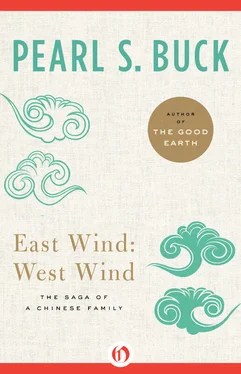I was greatly surprised to hear this. It seems to me this life of ours can certainly be considered wholly modern and independent of old restraints. The garden wall is merely for privacy. It would not be fitting for any vegetable vendor or passing candy seller to peer at us. I thought,
“What will she do in the courtyards, then?”
But I said nothing.
She is frank to show her love for my brother. Last night we sat in the garden to catch the coolness of the night. I sat in my accustomed place upon the porcelain seat, a little apart from the men. She seated herself beside me upon the low brick balustrade that surrounds the terrace, and in her half-smiling manner now when we are together, she pointed out one thing after another in the dim twilight, asking me the name of each and repeating the words after me. She is quick to learn, and she never forgets once she has heard rightly. She repeated each syllable over again and again softly, tasting its intonation, laughing a little when I corrected her shyly. Thus we amused ourselves for a space while the two men conversed.
But when the dusk of night fell, and we could no longer distinguish trees and flowers and stones, she became silent and restless. She turned her eyes toward my brother. At last she rose abruptly and went over to him with her swinging gait, the thin white stuff of her gown flying like a mist. She laughed, said something in a low voice to him, and then stopped at his side and reached openly for his hand.
I averted my eyes.
When I glanced again, pretending to feel the direction of the wind, she had curled herself upon the brick floor of the terrace beside his chair and had laid her cheek against his hand! I felt a pang of sympathy for my brother. He must have been ashamed at this open display of passion from a woman. I could not see his face in the dark, but all talk had ceased. There was only the pulsing murmur of summer insects through the garden. I rose and withdrew myself.
When my husband came in a few minutes later I said to him,
“She is indecorous, this foreigner!”
But he only laughed.
“Oh, no — only to you, little porcelain one!”
Indignation pricked me.
“Would you have me then clinging to your hand in public?” I asked, turning to look at him.
He laughed again, his eyes on me.
“No, for if you did such a thing, how truly indecorous it would be!”
I perceived that he was laughing a little at me, and since I did not know why, I said nothing more.
I do not understand this freedom of hers. And yet, most strangely, when I ponder it I do not discern any evil insinuation in it. She avows her love for my brother as simply as a child may seek its playmate. There is nothing hidden or subtle in her. How strange this is! It is not like our women.
She is like the blossom of the wild orange tree, pure and pungent, but without fragrance.
They have agreed together at last what they will do. She is to put on Chinese dress, and together they will approach the honored Old Ones. My brother has taught her the proper way to bow in their presence. I am to go before to prepare the way and to take the gifts.
I cannot sleep at night for thinking of the hour. My lips are dry, and when I would moisten them, my tongue also is dry within my mouth. My husband endeavors to encourage me with laughter and bold words, but when he leaves me again, I am afraid. I am openly taking part against my mother, I who in all my life before have never disputed her will.
Where does the courage come from in me to do this thing? I am a timid creature always, and left to myself I would see nothing but evil in it. I see clearly even now my mother’s heart in the matter. Alone, I would say that she is right according to the customs of our people.
It is my husband who has changed me, so that I dare, in spite of my fear, to speak for love even against my ancestors. But I tremble.
She, the foreigner, is the only calm one among us.
TO-DAY I AM WEARY and spent, My Sister. In my heart it is as though a harp string had been too tightly drawn for many days and then suddenly relaxed, so that music is dead in it.
The hour I have dreaded is over! No, I will not say how it went. I will tell you of the whole matter, and then you may judge of it for yourself. As for me — but I will not tell of the end before the beginning.
We sent the messenger to our parents, bearing our request that we be allowed to present ourselves the next day at noon. He returned saying that our father had left home for Tientsin as soon as he heard of my brother’s arrival. Thus did he avoid the difficult moment — thus has he ever avoided decisions! In his stead our mother appointed the hour of noon when she would receive my brother and me. Of the foreigner no mention was made, but my brother cried, “If I go, my wife will go, also.”
I went first, therefore, the next day, at the hour, and a servant bore gifts before me. My brother had chosen these gifts in foreign countries, and they were all curious and pretty things not often seen in our city — a tiny gilt clock set in the stomach of a gilded child, the whole not more than six inches in height; a watch cunningly embroidered with jewels to wear upon the wrist; a machine which when wound with a handle could speak and shout; a light which renewed itself without fire, however long it shone; and a fan of ostrich plumes, white as a drift of pear blossoms.
I went into her presence with these gifts. Our mother had sent word that she would receive us in the guest-hall, and there she was seated, as I entered, in the heavy dark carved chair of blackwood, at the right of the table under the painting of the Ming Emperor. She was robed in black brocaded satin, and in her hair were ornaments of gold. Upon her hands were many rings of gold, set with rubies and topaz, the stones fitting for the dignity of age. She leaned upon her staff of ebony and silver. I had never beheld her more stately in outward appearance.
But I knew her well, and I scanned her face closely to see how she really was in health, and my heart dropped in fear. The black of her garments but emphasized the transparent thinness of her face. So thin had she become that her lips had taken on the set curves almost of death itself, and her eyes had enlarged themselves, so that they were the sick and sunken eyes of the desperately ill. Upon her fingers the rings hung loosely and clattered against each other with a touch of dim music if she moved her hands. I longed to ask her how she really was, but I dared not, knowing it would annoy her. She had nerved herself to the meeting, and she had need of her strength.
Therefore when she received me without words, I presented the gifts, taking each from the hand of the servant and placing it before her. She acknowledged them with a grave inclination of the head, and without looking at them she motioned to her own servants who stood waiting near her, to remove them to another room. But her acceptance of them encouraged me somewhat. Had she declined them, in the language of gift-giving it would have meant that my brother was already refused. I said therefore,
“My honored mother, your son is here and awaits your pleasure.”
“It has been told me,” she replied coldly.
“He has brought the foreigner,” I ventured faintly, thinking it best to tell the worst at once, and yet having at my heart a sinking of spirit.
She was silent. I could make nothing of her face. It was immovable.
“May they approach?” I asked desperately, not knowing what else to say than what we had planned.
“Let him approach,” she replied in the same voice.
I hesitated, not knowing how to proceed. Was not the foreigner even then upon the very threshold? I went to the door where they stood waiting, and putting aside the curtain, I told my brother what our mother had said, and that he had better come first and alone.
Читать дальше











